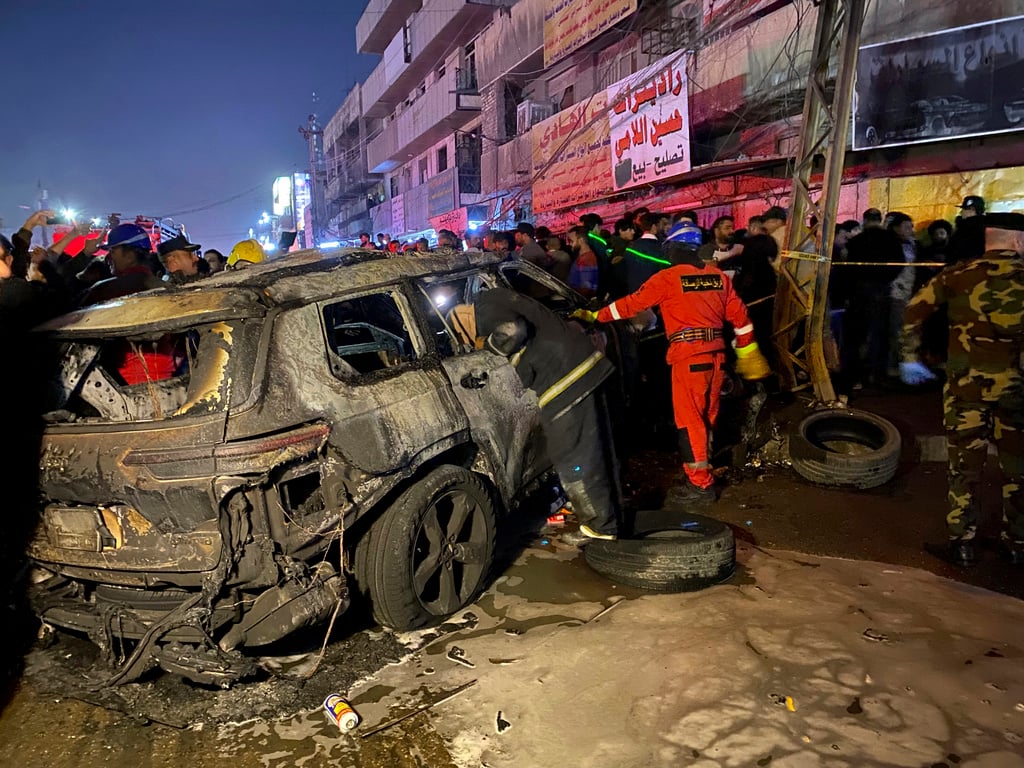
BAGHDAD, Feb 8, 2024 (BSS/AFP) - Iraq on Thursday condemned a US air strike that killed a senior commander from a pro-Iran armed group accused of having been involved in attacks on American troops in the region.
The US attack on Wednesday came after a wave of strikes on Iran-linked targets in Iraq and Syria last week following the killing of three American troops in neighbouring Jordan on January 28.
The US Central Command (CENTCOM) said the commander killed Wednesday was targeted "in response to the attacks on US service members".
The strike killed "a Kataeb Hezbollah commander responsible for directly planning and participating in attacks on US forces in the region," according to CENTCOM.
"The United States will continue to take necessary action to protect our people. We will not hesitate to hold responsible all those who threaten our forces' safety," it added.
Iraqi authorities slammed the strike as a "blatant assassination" in a residential neighbourhood of Baghdad.
"The international coalition is completely overstepping the reasons and objectives for which it is present on our territory," said Yehia Rasool, the military spokesman for Iraq's prime minister.
"This path pushes the Iraqi government more than ever before to end the coalition's mission which has become a factor of instability for Iraq," he added.
He was referring to the US-led international military alliance formed in 2014 to fight the Islamic State group -- the year the jihadist group overran nearly a third of Iraq's territory.
Kataeb Hezbollah -- which announced it was suspending its attacks on US forces after the deadly Jordan attack -- said one of its commanders had been killed, identifying him as Abu Baqr al-Saadi. He was responsible for "military affairs" in Syria, an official from the group told AFP.
The Hashed al-Shaabi, a coalition of mainly pro-Iran paramilitaries -- of which Kataeb Hezbollah is part -- now integrated into Iraq's regular security forces, also confirmed Saadi's death.
An interior ministry official said a total of three people -- two Kataeb Hezbollah leaders and their driver -- had died in the strike, which was carried out by a drone in the east Baghdad neighbourhood of Mashtal.
- 'Red lines' -
The latest US strike sparked widespread condemnation in Iraq, with a pro-Iran parliamentary coalition dubbing it an attack on "Iraqi sovereignty".
Washington has "crossed all red lines by targeting regular forces and men who contributed to defeating Islamic State terrorism," said the Coordination Framework, an alliance of pro-Iran Shiite parties that includes the Hashed al-Shaabi.
Iraq's pro-Iran Al-Nujaba movement in a statement promised a "targeted retaliation", assuring that "these crimes will not go unpunished".
The group added that American "violations" will not cease without "a firm official position from the Iraqi government".
US and allied troops have been targeted more than 165 times in the Middle East since mid-October in attacks linked to a surge in violence over the Israel-Hamas war in Gaza.
The majority of the attacks have been claimed by the Islamic Resistance in Iraq, a loose alliance of Iran-backed groups angered by US support for Israel in the war in Gaza.
Lebanon's Iran-backed Hezbollah group said "resistance movements in the region have total confidence" in their Iraqi counterparts and the commander's killing will only encourage them to continue acts they say are in support of Palestinians.
The United States considers Kataeb Hezbollah a terrorist group.
- 'Playing with fire' -
The Hashed al-Shaabi has said that 16 of its fighters were killed and 36 people wounded in US strikes on Friday, which Washington said hit 85 targets at seven different sites in Iraq and Syria.
"Targeting the Hashed al-Shaabi is playing with fire," the group's leader Faleh al-Fayyad warned later.
The Syrian Observatory for Human Rights war monitor said at least 29 pro-Iran fighters were killed in Syria.
Iraq analyst Sajad Jiyad, of the New York-based Century Foundation think tank, said he expected the tensions to continue to spiral.
"These groups have a lot of capabilities, they are active in several countries now, the US is willing to engage, to retaliate, to kill members of these groups," he said.
"The US is giving no indication it is going to pull back or stand down its military activity in the Middle East," he said, adding "it is very difficult to suddenly see an end to the tensions."
The United States and Iraq opened talks on the future of the US-led troop presence in January, following a request by Iraqi Prime Minister Mohamed Shia al-Sudani for a timetable for their withdrawal.
Washington has some 900 troops in Syria and 2,500 in Iraq as part of an international coalition against the Islamic State group.
Its troops in Iraq are deployed at the invitation of Baghdad, but those in Syria are located in areas outside Syrian government control.